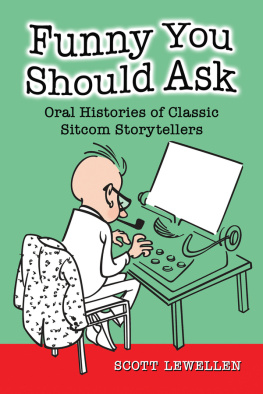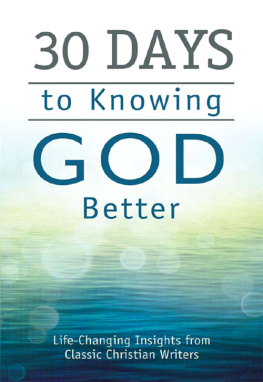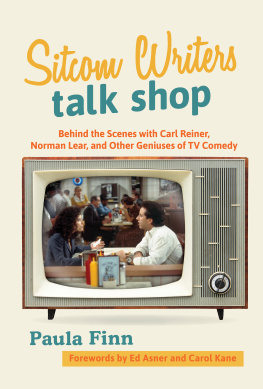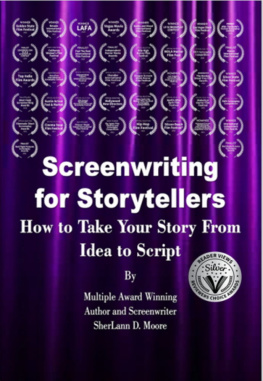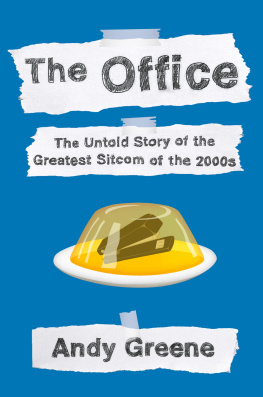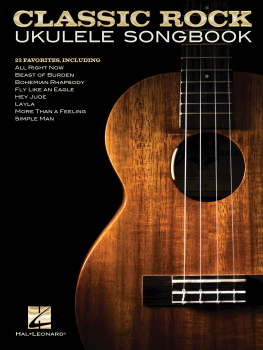
Funny You Should Ask
Oral Histories of Classic Sitcom Storytellers
SCOTT LEWELLEN

McFarland & Company, Inc., Publishers
Jefferson, North Carolina, and London
ISBN 978-0-7864-7148-5
LIBRARY OF CONGRESS CATALOGUING DATA ARE AVAILABLE
BRITISH LIBRARY CATALOGUING DATA ARE AVAILABLE
2013 Scott Lewellen. All rights reserved
No part of this book may be reproduced or transmitted in any form or by any means, electronic or mechanical, including photocopying or recording, or by any information storage and retrieval system, without permission in writing from the publisher.
On the cover: 1960s stylization of a man with typewriter (iStockphoto/Thinkstock)
McFarland & Company, Inc., Publishers
Box 611, Jefferson, North Carolina 28640
www.mcfarlandpub.com
Acknowledgments
Thank you to Bertha Garcia, Gwen Ecklund, Thomas Watson and Sam Bobrick for their assistance in arranging interviews, Christina Carroll, Sabrina Schiller, Abbie Schiller, Michael Q. Martin, Sharon Denoff, Arline Lloyd, Estelle Elinson and Douglas Denoff for providing permissions and photos, Keith Brown, Martin Gostanian and Mark Quigley for their help in gathering research, Mark Lunde, Gina Adam, Alice Lewellen, Kate Jordal, Wendy Gray, Brandon Klinge, Annie Fuhrman and Brian Sauer for their assistance with the manuscript and Sharon Henderson, Curt Lewellen, Mindy Toyne and Evelyn Lewellen for their support.
Special thanks to the writers who so generously offered their time and memories: Sam Denoff (June 22, 2001); Bob Schiller (August 18, 2001); Bob Carroll, Jr., and Madelyn Davis (September 8, 2001); Jack Elinson (October 31, 2005); David Lloyd (November 1, 2005); Paul Wayne (March 19, 2012); Sam Bobrick (March 19, 2012); Allan Burns (March 21, 2012); Jerry Mayer (March 22, 2012); Lila Garrett (March 23, 2012); Fred Freeman (March 26, 2012); Rick Mittleman (March 26, 2012); Elroy Schwartz (March 27, 2012); Austin Kalish and Irma Kalish (March 27, 2012); Carl Kleinschmitt (May 8, 2012); Saul Turteltaub (May 23, 2012); Arnold Margolin (May 25, 2012); Ed Scharlach (July 2, 2012); Bill Persky (July 10, 2012); Bernie Orenstein (July 18, 2012).
Preface
Imagine a job where you had to nd a logical way to set Lucy Ricardos putty nose on re. Or get laughs from Chuckles the Clownby killing him in the most bizarre fashion possible. Or carefully mix comedy and drama by causing Edith Bunker to nearly become a victim of sexual assault.
Although you are likely familiar with classic sitcom stars, the other stars of these shows are often overlooked. These series were written by a very talented group of men and women who toiled at their typewriters for decades. Funny You Should Ask:Oral Histories of Classic Sitcom Storytellers is about television sitcom writing from the perspective of 22 of televisions best and most prolic early comedy writers. I interviewed many of them in 2012 (a few together, most separately) but some much earlier, in 2005 and 2001. Their anecdotes are presented here thematically interrupted by me only when necessary.
Television is a writers medium. And sitcoms have been a major component of the industry since its infancy. Yet relatively little has been written about sitcom writers contributions to our culture. Their memories are important. Generally, the subjects of this book are not the writers or creators or producers who became moguls. The focus is on writers who mostly worked in the trenches, turning out dozens, even hundreds, of scripts.
What is perhaps most striking about these writers is their endurance and versatility. Their careers extended from the innocent but often hilarious sitcoms of the 50s and 60s to the more realistic and relevant shows of the 70s and 80s. Yes, the Bob Schiller and Bob Weiskopf listed in the credits of I Love Lucy were the same men who wrote many of the best episodes of the later seasons of All in the Family. They were among a number of former radio writers thriving in television in the 1980sincluding Bob Carroll, Jr., and Madelyn Davis; Jack Elinson; Austin Kalish; Milt Josefsberg; Howard Leeds; Fred Fox; Seaman Jacobs; Larry Rhine; Larry Gelbart; Aaron Ruben; Bill Davenport, and Arthur Julian. Likewise, many of the writers who entered the comedy writing eld in the 50s and 60s were still working many years into their career. Can we expect similar longevity and adaptability from more recent sitcom writers? In a business now fraught with ageism, its highly unlikely.
Although todays sitcoms retain some of the structure and techniques of their predecessors, they are written much differently (mostly in large groups) than early sitcoms. While some of those changes may be for the better, others clearly are not. Fortunately, for the rst 40 years of television, the writers chronicled in this book, along with their peers, dominated comedy. Their work still makes us laugh today. These are their experiencestold from their unique and humorous points of view.
The Writers
Bob Carroll, Jr., (d. 2007) and Madelyn Pugh Davis (d. 2011)Carroll and Davis were the epitome of a comedy-writing duo. For more than 35 years, they wrote hundreds of television sitcom scriptsalways as a team. They even shared credit on Davis 2005 autobiography. Their distinctive stamplogically plotted farces with a dose of meticulously scripted physical comedymarked most of their scripts and were often imitated by subsequent writers. Their style served them well in writing for the peerless Lucille Ball, beginning with Balls radio series, My Favorite Husband. Contributing to every I Love Lucy script, the team established their credentials as pioneering sitcom writers, with Davisnearly the only woman writing sitcoms in the early 1950salso paving the way for future generations of female writers. They continued to work with Ball on TheLucille BallDesi Arnaz Show specials and the rst two seasons of The Lucy Show. During a hiatus from Ball, they created and wrote more than half of the episodes of The Mothers-in-Law. Returning to Ball, they worked on Heres Lucy from 1970 to 1974. In 1977, Carroll and Davis were hired to produce Alice, which turned into an eight-year gig.
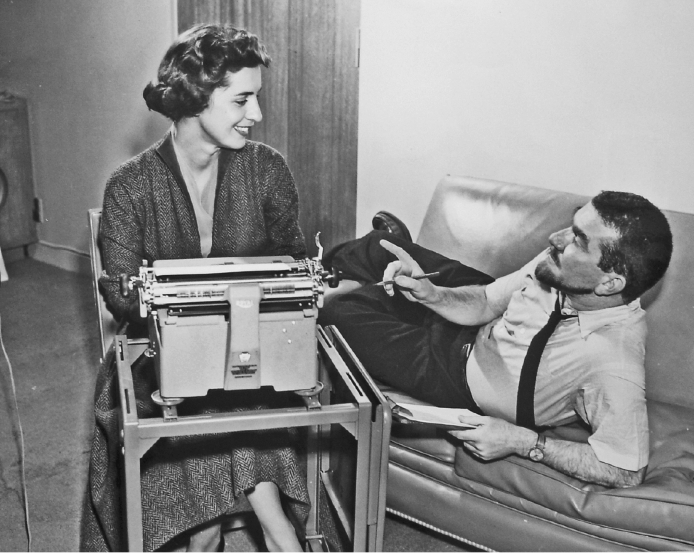
Madelyn Pugh Davis and Bob Carroll, Jr., during their radio days (courtesy Christina Carroll/Michael Quinn Martin Collection, used by permission, all rights reserved).
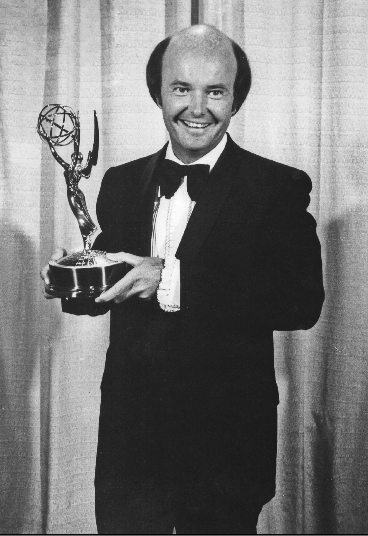
David Lloyd, 1976.
David Lloyd (d. 2009)David Lloyd was skeptical that anyone would want to read about him because he was just a hired gun and not a famous creator or executive producer. When Lloyd died, he was the subject of numerous Internet posts from fans who knew the words Written by David Lloyd frequently preceded a superior sitcom episode. Even Entertainment Weekly and Time weighed in on the incredible talents of this hired gun. While Lloyd gained immortality for writing the Chuckles Bites the Dust episode of The Mary Tyler Moore Show
Next page
